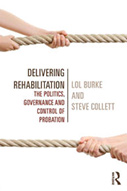Delivering Rehabilitation: The Politics, Governance and Control of Probation

Authors: Lol Burke and Steve Collett
Publisher: London; New York: Routledge, 2015. 200p.
Reviewer: Gwen Robinson | May 2016
This is a book about the delivery of probation services in England & Wales, and it is a subject on which the authors are undisputed experts. Both Lol Burke and Steve Collett are probation ‘lifers’, with decades of experience between them as practitioners, managers and educators, working mainly in the north-west of England. The authors’ professional histories give this book a particular authority which is sometimes absent in texts written by academics with more distance from their subject. With that authority comes a discernible passion for the subject matter – and at times an evident exasperation about the treatment of the probation service by successive governments since the early 1990s, which is the subject of the book. As readers may be aware, probation in England & Wales has a long and proud history as a public service spanning more than a century, but was in 2014 subject to a restructuring which has seen the ‘devolution’ of probation services for medium- and low-risk offenders to 21 new Community Rehabilitation Companies, which have been contracted to mostly private providers. Meanwhile, a new (and much smaller) public sector National Probation Service has been created to manage high risk offenders. The book’s title (and indeed the titles of all the individual chapters) is a play on words centred on contemporary official discourse about probation in England & Wales — specifically the policy (Transforming Rehabilitation) which ushered in the new probation structure (Ministry of Justice 2013).
Delivering Rehabilitation presents a persuasive account – and a searing critique – of the conditions arising from the emergence of that policy; a critique that is not just important and very timely, but also an engaging read. The book’s thesis is that the recent treatment and experience of the probation service “offers a fascinating historical and contemporary insight to wider social, economic and political thinking” (p. 67), not just about offenders, criminal justice and its institutions, but more broadly about the role of the state in relation to social problems. The book takes as its starting point Garland’s (2001) Culture of Control, the thesis of which was developed with reference to developments in both the UK and the United States. This is a sensible place to start for a number of reasons, not least (as Burke & Collett note) because there are already a number of books and scholarly articles dealing with probation in and prior to the 1990s, but also because Garland’s publication coincided with the first incarnation of a National Probation Service in England & Wales, a significant development in the governance of the service by an increasingly dominant political centre. The central argument ofDelivering Rehabilitation is that the treatment and experience of the probation service since the turn of the century has been an inevitable consequence of an unwavering commitment on the part of recent Labour and Conservative administrations to neoliberal ideology. This enduring ideology, they argue, has meant that successive governments have not only prized ideas about marketization and competition (resulting in a new penal marketplace), but has also encouraged a marked punitive turn in penal policy, as politicians from both main parties have sought to emphasise their superior punitive credentials with respect to those individuals proving resistant to strategies of ‘responsibilisation’. Both of these aspects of neoliberalism, the authors argue, have had a significant impact on the organisation, delivery and discourse of probation work.
One of the strengths of this book is that it does such a good job of contextualising developments in probation in relation to wider social, economic and political trends. Indeed, compared to many texts on probation, its scope is panoramic; whilst maintaining a clear focus on the world of probation (and detailing its many twists and turns in the last 15 years) the authors resist a myopic approach, constantly looking outwards to consider parallel developments in the spheres of social policy and beyond. In this way, probation is deployed as an effective case study, in which developments can be seen to both echo and be echoed in other domains. Another strength of the book is that it includes discussion of a number of key events which serve to illustrate the ways in which politicians have used moments of crisis to reinforce punitive and exclusionary strategies, or even to redefine the role of the state in relation to social problems. Among these examples are the murder of 2 year-old James Bulger by two 10-year-old boys in Merseyside in 1993; the small cluster of cases involving serious violent offences committed by people under probation or parole supervision in 2006-8; and the ‘riots’ which occurred in a number of British cities in 2011. Examples like these really help to bring the account alive, and to position probation as one of a number of casualties of contradictory and knee-jerk policy making.
It is also very refreshing to read a text in which ‘rehabilitation’ is understood as a broad endeavour aimed at encouraging desistance and involving the civic reintegration of ex-offenders. All too often – and certainly in the policies which Burke & Collett critique – rehabilitation is understood in purely instrumental terms — as a technical means of bringing about reductions in recidivism, as cheaply as possible. Burke & Collett are right to remind us that rehabilitation is not a commodity to be exchanged in a marketplace; nor are the thousands of dedicated people who still choose to work with offenders in the humanitarian tradition of the probation service. It is also refreshing to read a text in which poverty, class and race are rightly acknowledged as key social divisions.
By their own account, Burke & Collett are “pessimistic and critical” about the current state and future of probation (p. 183), and it is very easy to sympathise with their perspective. However, taking a critical stance of my own, I do question the inevitability of probation’s current predicament, and, by implication, the degree of determinism in Burke & Collett’s argument. I am not a historian, but others have argued that it is relatively easy to look back and build a picture that appears to confirm the inevitability of today, as though there was never an alternative path that might have been taken. Coincidentally, I read Delivering Rehabilitation just after finishing a journal article by David Green (2015). In that piece, Green exposes a recent and unforeseen shift in the US penal climate in favour of rehabilitation (and to a lesser extent decarceration), particularly among conservatives. Having identified and analysed the catalysts and drivers of this trend, Green warns against the privileging of structural explanations (among which he includes ‘neoliberalism’) that do not allow much room for unexpected turns of events such as this. In this vein, it is interesting to note that since the publication of Delivering Rehabilitation, the former Justice Minister (Chris Grayling), an architect of the Transforming Rehabilitation reforms (including the part-privatisation of probation services) has been replaced. Since taking office in May 2015, the new Minister (Michael Gove) has set about undoing several of the policies instigated by his forerunners, and appears to be taking a much more liberal and humanitarian stance. As Burke & Collet rightly observe, the privatisation of probation services “has all the hallmarks of a scorched earth policy” (p. 115) which would be difficult to undo. Nonetheless, my suspicion about the importance of Grayling’s personal vision and ambition in the rush to privatise probation services has been reinforced, and questions about the inevitability and particular timing of that development remain. To be fair, Burke & Collett do acknowledge that “deterministic intent is always mediated by the day-to-day rub of party political fortunes, personalities, events and even luck” (29), but perhaps they might have developed this aspect of their argument a bit more.
Like all good books, then, Delivering Rehabilitation raises questions and issues for further debate, as well as being an engaging and satisfying read. I wholeheartedly recommend it to anyone wishing to get to grips with British penal politics and, in particular, the recent history of probation services in England & Wales.
References
Garland, D. (2001) The Culture of Control: Crime and Social Order in Contemporary Society. Oxford: Oxford University Press.
Green, D. (2015) ‘US penal-reform catalysts, drivers, and prospects’, Punishment & Society, 17, 3: 271-98.
Ministry of Justice (2013) Transforming Rehabilitation: A Strategy for Reform. CM8619. London: Ministry of Justice.
Gwen Robinson, Reader in Criminal Justice, School of Law, University of Sheffield, UK


